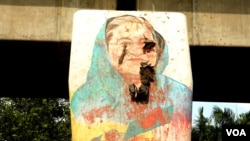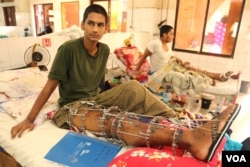India has shown no sign of complying with Bangladesh’s formal request to extradite former Prime Minister Sheikh Hasina from New Delhi. Hasina fled to India during the massive student-led protests of her regime earlier this year.
The Bangladesh foreign affairs adviser Md. Touhid Hossain told local reporters earlier this week that the country’s interim government had informed India of their request to send Hasina back for a "judicial process."
India confirmed receiving the request. "At this time, we have no comment to offer on this matter," said Randhir Jaiswal, spokesperson for India’s Ministry of External Affairs, on Tuesday.
Foreign policy experts in India have hinted that Hasina may not be sent back to Bangladesh so easily.
Pinak Ranjan Chakravarty, former Indian high commissioner to Bangladesh, told VOA via WhatsApp that when Hasina was sent to India by the military for her own safety, there were no legal cases against her. This would complicate extradition, he said, because it is a judicial process that requires solid evidence of a crime.
"Moreover, the bilateral extradition treaty has political exception clauses as well as clauses for fair treatment and safety. Unless these conditions are fulfilled, extradition could be denied," Chakravarty added.
Officials belonging to Bangladesh’s acting government said that Hasina committed several major crimes during her 15-year regime to hold onto power.
Bangladeshi student activist Nahid Islam, who serves as an adviser to the interim government, told VOA by phone that it is impossible to ensure proper democracy in the country until Hasina goes to trial.
Islam went on to recount the events of the July-August protests, where peaceful student demonstrations turned deadly after a violent crackdown from security forces, acting on Hasina’s orders.
"More than 1,000 students and other protesters, and children, were killed during the July-August uprising. Hasina is the main accused in these cases," he said. "She must undergo trial in Bangladesh and be held answerable for her actions."
The Dhaka-based International Crime Tribunal, a court of justice that investigates and prosecutes domestic war crimes, has issued arrest warrants against Hasina and her associates. She has been accused of orchestrating a genocide during the 2024 protests, alongside other "crimes against humanity" throughout her 15-year reign.
Student leader Islam said that besides the crimes during the protests this year, Hasina is also responsible for several illegal acts during her regime.
"She led the government that orchestrated thousands of enforced disappearances and extrajudicial killings. She is also accused of a massive level of malpractice during her regime," Islam told VOA."
Islam said the interim government will ensure justice for all the victims of the student protest mass killings, and other crimes spanning Hasina’s regime.
"We believe it is our responsibility."
Zafar Sobhan, editor at the Bangladeshi English-language daily Dhaka Tribune, said the country’s demand for Hasina’s extradition is not only justified but should be uncontroversial and agreeable to anyone who "cares about justice."
"Sheikh Hasina is credibly accused of extremely grave crimes. Apart from being accused in the killings of hundreds during the mass uprising against her misrule in July and August, and of other serious cases of abuse of power, extrajudicial killing, disappearances, as well as massive corruption and looting of the public exchequer during her rule," Sobhan told VOA by email.
Sobhan said Hasina must stand trial to send the message that no one is above the law, even when in power.
"Rulers need to know that there will be accountability for their misdeeds, otherwise Bangladesh will continue to suffer misrule," he said.
Sheikh Hasina, who has been staying around New Delhi reportedly at a residence provided by the Indian government, has not made any comment after Bangladesh sought her extradition from India.
But a senior leader of Hasina’s Awami League party said that the charges against the ousted PM were "baseless."
"The allegations of human rights violations, including enforced disappearance and extrajudicial killings, and other so-called malpractices during the regime of [former] Prime Minister Sheikh Hasina are nothing but baseless propaganda. Since August 5 a long time has passed by but they have not been able to raise or prove any specific allegations against her or her government," Sofioul Alam Chowdhury Nadel, organizing secretary of Hasina’s party, told VOA by text over WhatsApp.
Former Bangladeshi diplomat Khalilur Rahman said that it is irrefutable that Hasina committed "heinous crimes" that the world watched unfold in real time. He added that Bangladesh will hold her accountable, as they are obligated to follow the directions of the tribunal.
"We hope the Indian government will cooperate. Care should be taken to observe the extradition treaty between our two countries," Rahman told VOA by text over WhatsApp. He is the senior representative of the Chief Adviser Muhammad Yunus, who leads Bangladesh’s interim government.
Student leader Islam added that the interim government would take recourse through all legal and diplomatic means to bring Hasina back to Bangladesh to face trial.
"India should cooperate in the process of the democratic transition in Bangladesh by extraditing Sheikh Hasina for trial in our country. That way we ... the two countries ... can bolster our diplomatic relationship," Islam said.
"India will side with fascism, and stand against democratization in Bangladesh, if it does not extradite Hasina," he added.
Jon Danilowicz, a retired U.S. diplomat who has served in Bangladesh, said that it is worthwhile for Bangladesh to pursue the request even if India refuses to extradite Hasina.
"This will serve as a constant reminder that Bangladesh will continue to seek justice. For its part, India will need to choose whether it stands with the Bangladeshi people or with the deposed dictator. Similarly, Bangladesh should press India to return Hasina’s henchmen who have also sought refuge across the border," Danilowicz told VOA.
"India’s unwillingness to return these fugitives will be much more difficult to defend as it tries to position itself as a great power," Danilowicz said.





